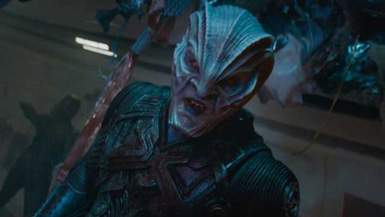Movie Review: Star Trek Beyond
By Ben Gruchow
July 28, 2016
BoxOfficeProphets.com

It’s certainly ephemeral, if we’re splitting hairs; the biggest reason the story’s tightness comes to mind right away is because most of everything else about the movie requires some level of mental effort to recollect. The movie’s scenario is fairly obvious: while answering a distress call from a distant planet, the crew of the U.S.S. Enterprise is led into an ambush led by Krall (Idris Elba), who is seeking an artifact held by Captain Kirk (Chris Pine). The ship crash-lands on the planet, the crew scattered by the landings of their escape pods, and then we spend the next 70 minutes watching both the crew and the plot slowly cohere.
It’s a numbingly simple setup, the kind of thing that gets jotted down over the course of a one-hour pitch meeting, and though I will not pretend to comprehend where this entry slots in with the remainder of the Star Trek film canon in terms of its storytelling complexity, it’s pretty clear that this was engineered to allow this third film to focus almost all of its energy on the byplay of its characters. That this produces a film that, like virtually every tentpole release so far this season, begins evaporating the moment it’s over is mostly inevitable; that it avoids the tortured storytelling mechanisms of 2013’s Star Trek Into Darkness is immensely relieving.
There are little flourishes of activity on the side that we’re meant to engage with secondhand. Kirk is planning on asking for a promotion to Vice Admiral of Yorktown (a planet-city with its own atmosphere, responsible for the first of the few truly immersive and vertiginous moments in the film). Spock (Zachary Quinto) and Uhura (Zoe Saldana) have ostensibly ended whatever relationship they had in the past. Spock has just received news that Ambassador Spock (a short cameo appearance by the late Leonard Nimoy), has passed away.
The artifact of Kirk’s that Krall seeks is called the Abronath, but its real name is the MacGuffin; when we find out that it is part of an ancient weapon that can vaporize lifeforms in moments (when we see this mechanism in action, it looks like nothing other than a malevolent cloud of nanorobots), we’re not much intimidated, because Krall already possesses technology that can vaporize a starship in minutes - and really, when you’re talking total destruction, does it really matter much whether it’s instant or almost instant? Krall has a secret history and origin of his own, though; he has the bumpy-forehead latex application familiar to anyone who’s ever worked in contemporary sci-fi, but he seems to know more about our protagonists aboard the Enterprise, and possess a vendetta against the Federation, that hints at greater motive.
Krall makes a better villain than Khan did. Part of this is because Idris Elba is a better actor than Benedict Cumberbatch. Part of it, though, is that his motivation (once revealed) is more immediate and horrifying than Khan’s was, and his rationale for taking the actions he does more understandable within the parameters of recognizably human behavior. Elba’s performance is the best in the film, only slightly eclipsing Simon Pegg’s Scotty (that the film was co-written by Pegg might have something to do with the Scotty character operating so snugly on its wavelength), but a good deal more charismatic and alive than Kirk or Spock, who seem to reside in the background of most scenes despite being the focus of most of the plot and subplots.
I write out these criticism-shaped arguments, but we’re talking more about simple observation here. Within the storytelling and thematic constraints of a mid-summer big-budget sequel, this is still a film that’s more interested in discovery and diplomacy and dialogue than it is in pyrotechnics, and it held my interest on those levels. I like to ID the modus operandi of the Star Trek franchise as being about the social and interpersonal aspects of space travel, while the Star Wars franchise is concerned more with set design, creature design, and special effects. I am not here to say whether one is better than the other in practice, because there have been greater and lesser entries in both; the Trek aesthetic appeals more to me.
This film does a little rudimentary exploration of the effects of time passing unnoticed, and how a short time can become a very long time with very little apparent difficulty. This manifests itself explicitly with some of the later details in the Krall storyline, and obliquely with the subplots and sometimes just the little things relating to the Enterprise crew. There is also poignancy in these details; this was one of the final films of the late Anton Yelchin, who plays Pavel Chekov, and there are two moments that seem to honor him. One involves a drink between Kirk and the ship’s medical officer, McCoy (Karl Urban); McCoy has confiscated a bottle of whiskey from Chekov’s locker, and the quiet toast that follows infers more meaning than it normally would have. This may have been unintentional; less so is a later moment that involves a cut to Yelchin during a key line.
This is an agreeably intimate and informal film, for one with a budget well into nine figures. Apart from the sporadic action sequences, which are variable in their scope and effect (the crash-landing of the Enterprise is a marvelous sequence, landing with surprising precision the chaos of attempting to solve a dozen little immediate crises at once, while the big crisis occurs unchecked in the background; the opening sequence, involving the first appearance of the Abronoth, is offputting and clumsy, and is mostly responsible for the uncertain note the movie starts off on), this is an interpersonal drama, inhabited by actors who comfortably understand the nature of their characters if not every dimension, that happens to take place against science-fiction trappings and backgrounds.